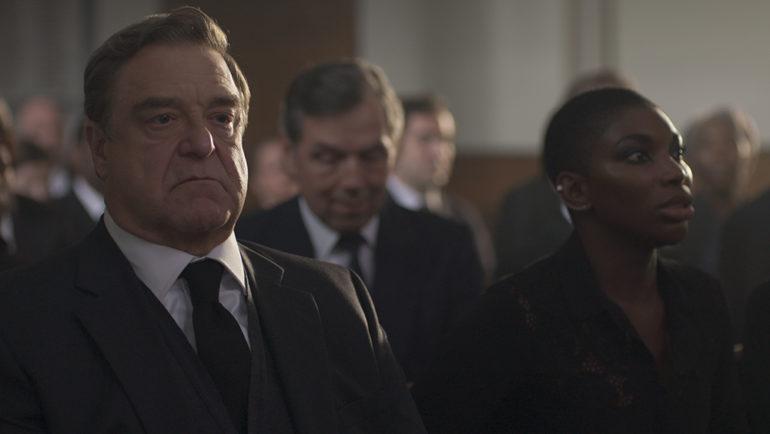TV Review: ‘Black Earth Rising’
By Daniel D’Addario
LOS ANGELES (Variety.com) – Bringing to bear a talented cast on a story of real geopolitical significance, “Black Earth Rising,” Netflix’s drama about the long-tail aftermath of the Rwandan genocide, would seem to have had the potential to be one of 2019’s early television successes. Which makes its falling short all the more painful and pronounced. The show, previously aired in the U.K. on BBC Two and written and directed by Hugo Blick (“The Honourable Woman”), squanders the audience’s goodwill with ill-conceived narrative turns, a reliance on cliché, and, worst, dialogue that defies belief. Its potential resonances as a story about how we metabolize, and prosecute, the worst of crimes ends up, soon enough, squandered as the audience loses faith in the story and its telling.
Michaela Coel (“Chewing Gum”) plays Kate Ashby, an investigator working for human-rights attorney Michael Ennis (John Goodman, taking a welcome break from “The Conners”). Ennis, an American, plies his trade in the United Kingdom — and Kate, an ethnic Tutsi woman adopted as a baby amidst the mass murder of her cohort in Rwanda, doesn’t quite know where she fits, a struggle that’s resulted in both a carapace of toughness and a roiling inner life. When her adoptive mother Eve (Harriet Walter), a prosecutor who works at the Hague, prepares to bring charges against a Tutsi leader for war crimes, Kate attacks her for not understanding the impact it’d have on their relationship. As the story proceeds, though, Kate finds herself both awash in complicated emotions of displacement and enmeshed in a story of increasing potential danger and intrigue.
All of which sounds fascinating on paper. But onscreen, the emotional core of the story is wasted; the relationship between Kate and Eve is cut short before it can develop further, ending with a burst of invective from Kate when a fuller investigation of the complicated interplay between a white British mother and her black Rwandan daughter could have borne fruit. And the grand adventure aspects of the story, kicking off with a risible action sequence in which Kate races through an air vent to find an unseen assailant, play as unintentional comedy.
Worst of all, even when she’s not playing at vent-crawling superheroics, Kate never feels real. As a character whose sense of alienation both from her country of origin and the country she presently inhabits, her struggle is relatable to millions of potential viewers, but as a figure who spouts lines like “Nothing about me is normal” or “Don’t expect me to behave the way others do,” she’s a cardboard cutout of an angsty rebel. By the time she throws herself at Goodman’s character (the second black woman to do so in a single episode, incidentally), it’s become clear the show has no real idea of how to write Kate as anything other than living symbol of the aftermath of war. (Goodman’s character is similarly freighted with trauma — he’s a physically ill alcoholic with a daughter in a coma — that supplants, rather than develops, character development.) Kate’s backstory is tragic and evocative, yes. But the character, despite the best efforts of the gifted Coel, doesn’t evolve past a list of biographical details.
Which raises questions about why “Black Earth Rising” exists at all, so inept is it at conveying the struggle at its center. Written and directed by a white Briton, the series places at its center a woman scarred (in all senses) by her personal history, and it has no idea what to do with her besides trauma that announces itself through aberrant behavior and rage. Both of those reactions are merited, but, bolstered as they are with dialogue that’s perpetually just announcing Kate’s state of mind with none of the shading or nuance of human speech, neither are ever believable. Perhaps, given the obvious difficulty he evinces in depicting what life would be like and what politics would feel like for a Rwandan adoptee, Kate’s was not Blick’s story to tell.
“Black Earth Rising.” Jan. 25, . 60 min. Eight episodes (four screened for review).
Cast: Michaela Coel, John Goodman, Harriet Walter, Tamara Tunie,
Noma Dumezweni
Executive producers: Hugo Blick,
Greg Brenman.

